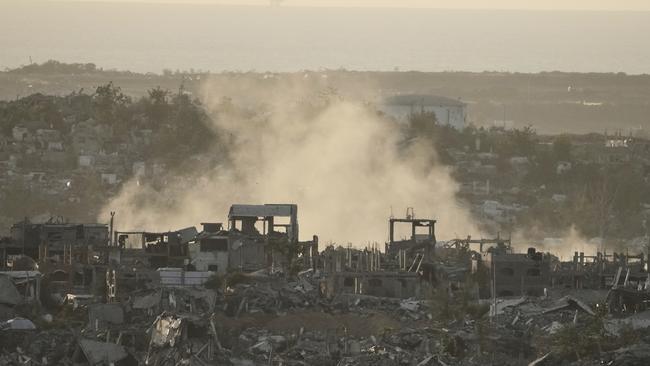Netanyahu confronts new political dilemma as allies push for end to Gaza war
As the UK suspends free trade talks and the US pushes for an end to the Gaza war, Benjamin Netanyahu must end the conflict and risk his government’s collapse, or sacrifice international support.

Mounting pressure from Israel’s allies including the US to wrap up the war in Gaza is confronting Israeli Prime Minister Benjamin Netanyahu with a dilemma: end the conflict and risk the collapse of his government, or plough on and sacrifice international support.
On Tuesday, UK Foreign Secretary David Lammy said Britain was suspending free-trade talks with Israel and summoned Israel’s ambassador, saying that the “11-week block on aid to Gaza has been cruel and indefensible.” Israel said the talks were already stalled.
The UK government also sanctioned two settler outposts and three individuals in the West Bank. “Israel’s actions are intolerable,” Lammy said.
The UK has also started drawing up plans with other countries to impose sanctions on Bezalel Smotrich, Israel’s finance minister, Itamar Ben-Gvir, the national security minister, and Israel Katz, the defence minister, among others.
Lammy’s comments represent Britain’s strongest condemnation of Israel since the war with Hamas started in 2023. Earlier this year Lammy said Israel’s blockade of aid and food to Gaza was a breach of international law. In September the government suspended some arms sales to Israel.
A clear majority of EU member states have backed a Dutch proposal to review the bloc’s trade deal with Israel, while Israeli allies France, the UK and Canada earlier this week called on the prime minister not to pursue the new ground offensive that he says will involve capturing all of the strip. Israel’s European allies and Canada said Monday they would “take further concrete actions” if Netanyahu expanded the war and suggested they would consider targeted sanctions in the Israeli-occupied West Bank.
But crucially for Netanyahu, the White House made clear Monday that President Trump wants the war to end, just a day after Israel said it had begun a new offensive in the Palestinian enclave. White House press secretary Karoline Leavitt said Trump “wants to see this conflict in the region end. He wants all hostages to be released.” Netanyahu’s office didn’t respond to a request for comment on the White House statement.

The U.S. pressure is forcing the Israeli prime minister to alter his calculations as he weighs whether to continue prosecuting the war in Gaza. Up to now, he has chosen to fight on in pursuit of his ultimate war aim of ridding the Palestinian enclave of Hamas. Recent US statements and the spectre of sanctions threaten his ability to do so with a free hand.
Netanyahu, who bowed to U.S. pressure to allow a small amount of aid into the Gaza Strip this week, said the threat of sanctions offered Hamas a “a huge prize,” for the Oct. 7, 2023, attack that sparked the war.
On Tuesday, Israel allowed around 100 trucks carrying aid to enter Gaza, after approving just nine on Monday, only five of which entered the strip, Jens Laerke, spokesperson for the United Nations humanitarian office, said.
The dilemma over whether to continue the conflict is somewhat familiar for the Israeli prime minister. When Joe Biden was president, he put tremendous pressure on Netanyahu to send more humanitarian aid into Gaza and accept a ceasefire deal that would free the hostages held by Hamas. But Netanyahu used those calls to his political advantage by defying them and showing his right-wing base that he could stand up for Israel.
That approach also received support from Republicans in Congress, who were eager to criticise Biden’s foreign policy.
This time, however, the pressure is coming from Trump. The chances of the Republican party turning on the president over Israel are slim. If he loses U.S. support, Netanyahu risks a damaging cornerstone of Israeli foreign policy to pursue his current path.
“Israel is a strong country but it’s not a super power. It cannot act against the whole world,” said Shmuel Rosner, senior fellow at the Jewish People Policy Institute in Jerusalem.
On Tuesday, Trump’s Special Envoy for Hostage Response Adam Boehler said the president still supports Israel even as he calls for an end to the war.
“President Trump’s support for Israel is ironclad,” he said on Fox News.
The growing pressure on Netanyahu comes as Israeli mediators are in Doha, Qatar, working to negotiate a deal with Hamas that would end the war and free the remaining hostages. Qatar’s prime minister said Tuesday that the negotiations had collapsed because there was a “fundamental gap” between the two parties. Israel, whose negotiators remained at the talks, wants an interim deal with a possibility of ending the war, while Hamas is insisting on a commitment by Israel to stop the war at once.
In recent weeks, the U.S. has made a series of moves in the Middle East that have surprised and sidelined Israel, including opening direct nuclear talks with Iran, striking a ceasefire deal with the Houthis, negotiating the release of American-Israeli hostage Edan Alexander directly with Hamas and lifting sanctions on the new Syrian government, which Israel still views as a threat.
These moves, said former Israeli ambassador to the U.S. Michael Oren, broke a longstanding principle that neither country would surprise the other when it came to policy changes related to the other’s security.
In previous confrontations between Israel and the White House, Oren added, leaders in Jerusalem were able to turn to the U.S. Congress for support. But now, between Democrats staunchly opposed to the current Israeli government and Republicans wary of opposing Trump, Netanyahu has little room to manoeuvre in Washington.
Netanyahu’s far-right allies, who have enough seats to rob the coalition leader of a majority in parliament, had said they would leave the government if any more aid entered Gaza that could reach Hamas. So far, those ministers haven’t followed through on their threat.
If elections were held now, polls show Netanyahu and his right-wing political alliance would lose power.
Analysts say Netanyahu is also thinking about how he will sell his handling of the war ahead of elections set for October 2026.
“It’s crystal clear for the government: they need to achieve the aims of the war before elections,” said Amir Avivi, a former defence official close with the current Israeli government and security establishment.
After Israel’s first ground operation following the Oct. 7, 2023, attack, Hamas re-infiltrated areas that Israel had cleared and from which it then withdrew.
This time, Israel plans to hold territory and push civilians away from the fighting, hoping it will give them a better chance at eradicating Hamas. But with the growing diplomatic pressure, Netanyahu might be forced to end the war before his primary goal of defeating Hamas is achieved.
Many Israelis are also getting tired of the war and favour a negotiated settlement to end it, polls show. Reservists are exhausted after 19 months of battle and people are angry that there are still some 20 hostages left alive in Gaza and the bodies of over 30 more in the enclave.
Left-wing opposition party head Yair Golan on Tuesday sharply rebuked the prime minister for his handling of the war and the damage it was doing to Israel’s global reputation. “Israel is on the path to becoming a pariah state among the nations, like the South Africa of old, if it does not return to behaving like a sane country,” Golan said. The politician has been growing in popularity, with some polls showing that his Democrats party would be the third or fourth largest in Israel if elections were held now.
Netanyahu’s refusal to engage in any plan to install a different Palestinian administration inside Gaza is to blame for the current political crisis, said Yaakov Katz, a fellow at the Jewish People Policy Institute.
It has led allies to assume that Netanyahu is drawing out the war for political purposes, or that he intends to impose a permanent Israeli occupation of Gaza, which they oppose, Katz said.
In his recent four-day visit to the Middle East, Trump cut major financial and diplomatic deals with Gulf states and Syria, but didn’t visit Israel.
“You cannot ignore the fact that Donald Trump is moving ahead in trying to create a new Middle East but without Israel,” said Katz.
Dow Jones



To join the conversation, please log in. Don't have an account? Register
Join the conversation, you are commenting as Logout